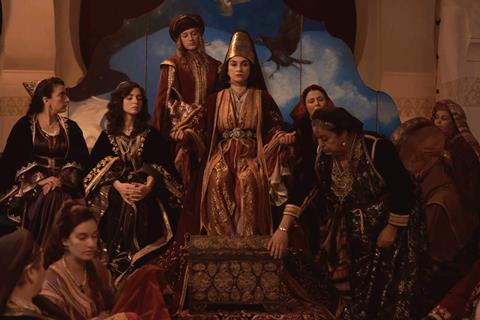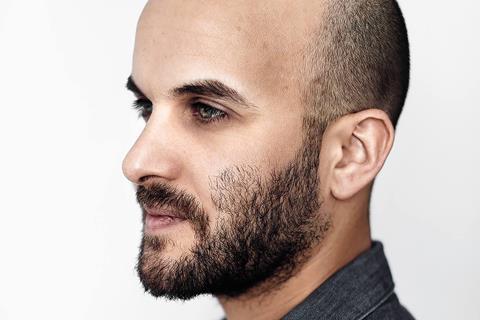
Algerian cinema has enjoyed a high profile at Cannes over the past decade, with titles making a splash including Karim Moussaoui’s Waiting For Swallows, Mounia Meddour’s Papicha and Amin Sidi-Boumédiène’s Abou Leila.
French-Algerian director Damien Ounouri is hoping to continue the trend this year with his debut feature The Last Queen, which breaks fresh ground for Algerian cinema as its first-ever full-scale costume drama. Set in the Mediterranean port city of Algiers in 1516, it revolves around the heroic female figure of Zaphira, who stood up to the infamous pirate Barbarossa after he killed her husband King Salim Toumi, took control of the city and demanded her hand in marriage.
Toumi had originally invited Barbarossa to Algiers to help the then city-state fight off Spanish invaders, but the pirate would betray the king and then pave the way for the Ottomans to take control.

“It unfolds at a historic moment in the history of Algiers when everything shifted as Berber rule was crushed and replaced with Ottoman empire,” explains Ounouri
The director has been showcasing work-in-progress extracts from the feature at the Doha Film Institute’s annual project and talent incubator event, which is running online from March 18-25.
Ounouri co-wrote the screenplay and developed the project with Algerian actress, scriptwriter and producer Adilia Bendimerad under the banner of their Algiers-based production company Taj Intaj.
The pair have been working together since Ounouri’s medium-length mermaid-themed drama Kindil el Bahr, in which she starred. The contemporary drama explored violence against women through the tale of a young woman who is attacked by a group of men while swimming in the sea. It premiered in Directors’ Fortnight in 2016.
The Last Queen grew out of a shared desire to move away from social issues-based drama into another genre and explore Algeria’s pre-Ottoman-era history.
“When people look at Algerian history, they tend to focus on French colonialism, or the Ottoman Empire before that. We wanted to go back further,” explains Ounouri. “A lot of Arab cinema – partly for reasons of budget – focuses on social issues, we wanted to try something with adventure and emotion that makes people dream even if making a costume drama was more of a challenge.”
A Virginia Woolf-like approach
Historians are at odds over whether Zaphira really existed, even if traces of her legend can still be seen in the street and restaurant names of Algiers’ Casbah neighbourhood.
“These doubts around only fuelled our interest. We felt if Zaphira did exist, it’s interesting to understand why she was erased and if she didn’t exist, why she was invented,” says Ounouri. “Women and their worlds have been erased throughout history. Often, it’s only the woman who exhibited traditionally male characteristics, who were warriors, who entered the battlefield, who get celebrated. We took a Virginia Woolf-type approach, looking at how a woman could exert influence over a situation even if she was not physically at the top table.”
Bendimerad plays Zaphira opposite French-Algerian actor Dali Benssalah as Barbarossa. Rising French actress Nadia Tereszkiewicz also features in the cast as one of the pirate’s mistresses. Benssalah broke out internationally last year in the latest instalment of the James Bond franchise No Time To Die. Ounouri signed the actor prior to this role after seeing his performance in the Algeria-set music video for a track called Territory by Paris-based music and videomaking duo Guillaume and Jonathan Alric, known artistically as The Blaze.
“I was blown away by his performance but assumed he was an ordinary guy from the French suburbs and then discovered he was a theatre actor,” says the director.
Production challenges
It has been a near six-year journey for Ounouri and Bendimerad to get the film made, with key challenges being raising the finance; researching and creating the world of 16th Century Algeria and then the Covid-19 pandemic, which stopped the first attempt to shoot the film in March 2020 in its tracks.
“The financing was long and complicated we don’t have a real cinema economy in Algeria and people couldn’t grasp our plans for a full-blown costume drama set in 16th-century Algeria,” says Ounouri.
The budget has been pulled together from 15 different sources of finance, including the Cinéma du Monde fund of France’s National Cinema Centre (CNC), the DFI and Orange Studio, which has entrusted the Paris-based sales company Party Film Sales with the international sales mandate. Other key partners include French production house Agat Films & Cie - Ex Nihilo.
The creation of the décor and the costumes was led by Algerian architect and designer Feriel Gasmi Issiakhem and French Algeria-based costume designer Jean-Marc Mireté.
“We pieced together different decors like a puzzle. Little remains of Algeria’s pre-Ottoman architectural heritage. It has been destroyed over successive invasions,” says Ounouri.
For the costumes, very little documentation still exists around how people dressed in 16th Algiers, but Bendimerad and Mireté did painstaking research, using rare prints and texts on the period as well as textiles, to develop an ornate and layered look. Setting up a workshop in the offices of Taj Intaj, Mireté brought the concept art to life with a team of local seamstresses and embroidery and pearl-work specialists.
Having been forced to put the production on hold in early 2020, the shoot eventually went ahead from October to December 2021.
“We’ve been working non-stop since then on post-production and we’re 90% there,” says Ounouri, who is hoping to world premiere the film in Official Selection or one of the parallel sections at Cannes. As the production races to complete, Ounouri acknowledges the feature has taken on an unexpected contemporary resonance with the recent Russian invasion of Ukraine.
“Unfortunately these cycles of war and violence give the film a universal dimension. Even if the story unfolds in 16th century Algeria, it will resonate with contemporary history. The same mechanism, the attempt to seize power with underhand behaviour and then efface the loser, is still at play today.”






![The Brightest SunScreen[Courtesy HKIFF]](https://d1nslcd7m2225b.cloudfront.net/Pictures/274x183/3/5/0/1448350_thebrightestsunscreencourtesyhkiff_312678.jpg)


















No comments yet